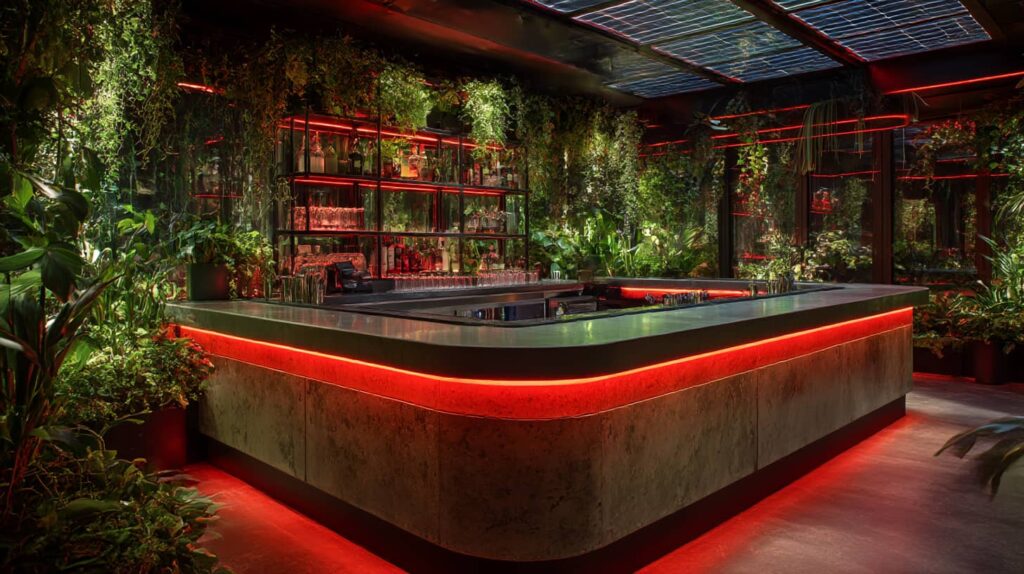Zero waste, carbon neutral, circular economy - terms that are used in every boardroom discussion. But what do they actually mean for a bar? A restaurateur from Munich dared to experiment: can a fully automated cocktail bar be both more sustainable and more profitable?
Spoiler: The result surprised even environmental activists.
The green turning point
The figures were shocking: 40% overdosing during manual cocktail preparation, 15 litres of water wasted daily through cleaning cycles, 234 disposable plastic cups per week for personal testing.
"I thought I was running an environmentally conscious bar," admits the owner. "In fact, I was an environmental offender without realising it."
The solution came in the form of an inconspicuous machine that changed everything.
Precision Pouring: Less is more
What happens when every cocktail is dosed with mathematical precision? The calculation is simple: instead of an estimated 4cl of rum, exactly 4.0cl are added to the glass. With 200 cocktails a day, that's 40cl less wastage.
Annual balance sheet of precision:
- Spirits saved: 146 litres
- Reduced CO2 emissions: 2.3 tonnes
- Cost saving: 4,680 euros
- Additional profit: 100% of savings
A supplier from Hamburg comments: "Our sustainability-conscious customers order 30% fewer spirits, but sell just as many cocktails. That's real efficiency."
Water: the underestimated commodity
Traditional bars consume vast amounts of water. Washing glasses, cleaning shakers, cleaning workstations. Each cocktail indirectly uses 2.4 litres of water.
Automated water efficiency:
- Closed cleaning circuits
- Minimal water technology
- Recycling systems for cleaning water
- 78% less water consumption per cocktail
Water balance after one year:
- Traditional bar: 175,200 litres
- Automated bar: 38,544 litres
- Savings: 136,656 litres
This corresponds to the annual consumption of four households.
Energy: Smart is sustainable
Modern cocktail machines are efficiency wonders. While traditional bars have to constantly cool, heat and light, vending machines work on demand.
Energy consumption in comparison:
Traditional bar equipment:
- Cooling systems: 180 kWh/month
- Lighting: 120 kWh/month
- Additional appliances: 95 kWh/month
- Total: 395 kWh/month
Automated bar station:
- Integrated cooling: 85 kWh/month
- LED lighting: 12 kWh/month
- Automation: 45 kWh/month
- Total: 142 kWh/month
CO2 reduction: 1,518 kg per year
Waste: From linear to circular
The hidden sustainability killer in bars: production waste. Spilt drinks, incorrectly dosed cocktails, discarded faulty batches.
Zero waste through automation:
- No overdosing = zero waste
- Perfect recipes = no faulty batches
- Closed systems = minimum spillage
- Precise ordering = optimised warehousing
An environmental consultant from Berlin: "This bar produces 85% less waste than comparable businesses. This is the circular economy at its best."
Social sustainability: the human factor
Sustainability means more than just environmental protection. Social aspects also count: Workplaces, working conditions, work-life balance.
Positive social effects of automation:
- Reduced stress for service staff
- More flexible working hours possible
- Less physically demanding activities
- More time for guest care
A service employee reports: "I used to be completely exhausted after eight hours of bar service. Now I concentrate on selling and advising. Much more relaxed."
The business case for green bars
Sustainability costs money? A myth that modern technology disproves.
Sustainability ROI after 18 months:
- Energy cost savings: 2,340 euros
- Water cost savings: 1,890 euros
- Material savings: 4,680 euros
- Total savings: 8,910 euros
- Investment in cocktail machine: 15,000 euros
- Amortisation: 30 months
Plus: Image improvement, marketing benefits, employee satisfaction.
Marketing with a clear conscience
Sustainable bars are becoming a magnet for conscious consumers. Generation Z and millennials favour companies with clear environmental standards.
Marketing effects of a green bar:
- 34% more young target groups
- Positive PR at no extra cost
- Social media content with purpose
- Differentiation from the competition
A marketing expert from Stuttgart: "Sustainability sells itself. Authentic green bars have waiting lists."
Certification: making sustainability measurable
Modern cocktail machines enable precise sustainability measurement. Every litre saved, every kWh saved is documented.
Possible certifications:
- B-Corp status for sustainable companies
- Green Key for environmentally friendly catering
- LEED points for sustainable buildings
- EU Eco-Label for environmental excellence
The future is green and profitable
What began as an environmental experiment has developed into a formula for success. Sustainability and profitability are mutually reinforcing.
The realisation: Technology not only makes sustainability possible, it makes it profitable.
One year later:
- 64% less environmental impact
- 23% higher profit margin
- 89% Employee satisfaction
- 45% more environmentally conscious regular guests
Sustainability is not the future - it is the profitable present.
